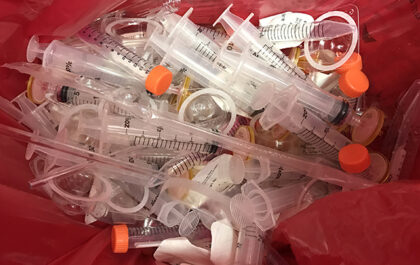Laundry detergent is a common household item. For some people, laundry detergent can cause an allergic reaction. Recognizing the symptoms of a laundry detergent allergy is the first step toward finding relief. Here is how to identify a laundry detergent allergy and what you can do to alleviate the symptoms:
Table of Contents
Causes of Laundry Detergent Allergies
An allergic reaction can be caused by one or more ingredients in laundry detergent. These are commonly fragrances, preservatives, dyes, and surfactants. The severity of the allergy varies from person to person, with some experiencing mild symptoms and others experiencing a more severe reaction.
Symptoms of a Laundry Detergent Allergy
The symptoms of laundry detergent allergies can vary depending on the severity of the allergy. Here are some common symptoms:
Skin Irritation
One common symptom of laundry detergent allergies is skin irritation. This can manifest as itching, redness, and swelling.The symptoms may be localized to the area of the body that came in contact with the detergent or may be more widespread.
Respiratory Problems
Exposure to laundry detergent may cause respiratory problems, such as wheezing, coughing, and shortness of breath. This may be more common in people who have asthma or other respiratory conditions.
Eye Irritation
Exposure to laundry detergent can also cause eye irritation, such as redness, itching, and watering. This can occur if the detergent comes into contact with the eyes or if the person rubs their eyes after handling the laundry.
Diagnosing Laundry Detergent Allergies
If you notice any of the mentioned symptoms, you may have a laundry detergent allergy. You should see a doctor or an allergist for a proper diagnosis. The doctor will take a detailed medical history and perform a physical exam to rule out other causes of the symptoms. They may also perform a skin patch or blood test to confirm the diagnosis.
Treating Laundry Detergent Allergies
The best way to treat a laundry detergent allergy is to avoid exposure to the allergen. Here are some tips to help you avoid exposure:
Switch to a Fragrance-free or Hypoallergenic Detergent
If you have a laundry detergent allergy, switch to a fragrance-free detergent. Fragrances are a common allergen. Certain chemicals can also irritate those with sensitive skin.
Hypoallergenic detergents are designed for people with sensitive skin and are free from common allergens or chemicals known to irritate sensitive skin.
Rinse Your Clothes Thoroughly
Rinsing your clothes thoroughly after washing can help remove any residual detergent causing your symptoms. Use an extra rinse cycle to make sure that all the detergent is removed.
You may also consider cleaning the inside of the washer regularly to avoid any detergent buildup that could get on clothes after they’re rinsed.
Wear Gloves When Handling Laundry
Wearing gloves when handling laundry can help protect your skin from exposure to the allergen. Consider gloves that cover the hands as well as wrists to make sure your skin doesn’t come into contact with the clothes. Long-sleeved shirts and long pants may also be a good idea.
Avoid Fabric Softeners and Dryer Sheets
Fabric softeners and dryer sheets can contain chemicals that can irritate the skin and cause an allergic reaction. They may cause allergy symptoms to persist even when you’ve avoided contact with the laundry detergent. Avoid using the softener and sheets if you have a known allergy or if you continue to have a reaction when doing your laundry.
Finding Relief
You can take several steps to reduce your risk of experiencing an allergic reaction, like switching to detergent without added fragrances or chemicals. By taking these steps, you can help keep your skin irritant-free.
If your symptoms persist despite these measures, or if you have a severe allergic reaction, seek medical attention. Your doctor may prescribe medications such as antihistamines or corticosteroids to help alleviate your symptoms.
Laundry detergent allergies are a common problem that affect many people. The symptoms can range from mild to severe. Recognizing any signs and symptoms is the first step toward finding relief. If you suspect you may have allergies, seeing a doctor or an allergist is a good idea for a proper diagnosis.
Related posts
When was the first presidential election in the US?
The election process in the world’s most powerful nation, the US, has come a long way. Various amendments have been made to the Constitution that allowed black men, white women and other disadvantaged groups to participate in the elections. Further amendments during the 60s and…
Tips & Trick For Healthy Glowing Skin
Lorem ipsum dolor sit amet, consectetur adipiscing elit. Nam laoreet, nunc et accumsan cursus, neque eros sodales lectus, in fermentum libero dui eu lacus. Nam lobortis facilisis sapien non aliquet. Aenean ligula urna, vehicula placerat sodales vel, tempor et orci. Donec molestie metus a sagittis…
My Fight With Depression. Concussions
Lorem ipsum dolor sit amet, consectetur adipiscing elit. Nam laoreet, nunc et accumsan cursus, neque eros sodales lectus, in fermentum libero dui eu lacus. Nam lobortis facilisis sapien non aliquet. Aenean ligula urna, vehicula placerat sodales vel, tempor et orci. Donec molestie metus a sagittis…
Top 10 most visited tourist places in the world
Lorem ipsum dolor sit amet, consectetur adipiscing elit. Nam laoreet, nunc et accumsan cursus, neque eros sodales lectus, in fermentum libero dui eu lacus. Nam lobortis facilisis sapien non aliquet. Aenean ligula urna, vehicula placerat sodales vel, tempor et orci. Donec molestie metus a sagittis…
How Digital Health Technology Is Beneficial?
Digital health revolves around the usage of diverse technological platforms including mobile health, teen health, configurable remote patient monitoring, etc to improve the connection between the patients and the doctors. Across the healthcare system, the horizon and scope of digital health have helped create opportunities…
How Latest Farmtrac Tractors are Improving Farming in India?
India mostly relies on farming, and a large part of the population depends on it for their livelihoods. Recently, there’s been a big shift towards using modern farming techniques and machinery to make farming more productive and efficient. A good example of this is the…
Dispelling Myths: Demystifying Rx Waste and Expiration Dates – WasteX Pharmaceutical Waste Disposal Separates Fact from Fiction
The specter of “expired” medication looms large, conjuring images of potent chemicals wreaking havoc on water sources and ecosystems. But before you panic toss that bottle of pills, let’s delve into the truth about pharmaceutical waste and expiration dates, separating fact from fiction. At WasteX…
Sustainable Living in Memphis: Green Initiatives and Eco-Friendly Hotspots
Memphis, a city known for its rich cultural heritage and vibrant atmosphere, is increasingly becoming a hub for sustainable living. As environmental awareness continues to grow, residents and businesses in Memphis are embracing green initiatives and fostering eco-friendly practices. Let’s explore the city’s commitment to…
Today's pick
Hot topics
Stay connected
Meet the Author

Gillion is a multi-concept WordPress theme that lets you create blog, magazine, news, review websites. With clean and functional design and lots of useful features theme will deliver amazing user experience to your clients and readers.
Learn moreCategories
- Animals (7)
- Apps & Softwares (8)
- Automotive (8)
- Beauty (8)
- Business (141)
- Cars (12)
- Cartoon (3)
- Cook (4)
- Cooking (1)
- Design (8)
- Economy (6)
- EDUCATION (25)
- Entertainment (16)
- Fashion (23)
- Fitness (2)
- Food (16)
- Gaming (51)
- Guide (20)
- Health (119)
- Home (52)
- Home improvement (12)
- Interior (3)
- Law (16)
- Life (1)
- LifeStyle (99)
- Marketing (5)
- Motivation (9)
- Movie (6)
- Movies (1)
- Music (3)
- News (8)
- Painting Art (1)
- People (15)
- Photography (7)
- Review (113)
- Services (7)
- Social Media (6)
- Sport (9)
- Sports (12)
- Style (10)
- Swimming (1)
- Tech (125)
- Travel (26)
- Uncategorized (17)
- Vape (5)
- Western (3)
- World (2)










